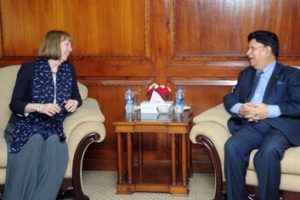As the country reopens, employers are looking into how to safely bring back their workers. One recurring question: Should they be tested for the new coronavirus?
Some businesses are moving ahead. In Indianapolis, family-owned Shapiro’s Delicatessen tested about 25 employees in its parking lot this month.
Amazon plans to spend as much as $1 billion this year to regularly test its workforce while laying the groundwork to build its own lab near the Cincinnati airport.
Las Vegas casinos are testing thousands of employees as they prepare to return to work, collecting nasal samples in convention halls.
And MLB, eager to begin its season, is proposing a detailed regimen that involves testing players and critical staff members multiple times a week.
While public health experts and government officials have emphasized that widespread testing will be critical to reopening, there is little clear guidance from state and federal agencies on the role employers should play in detecting and tracking COVID-19. As a result, businesses are largely on their own in sorting out whether to test — and how to do it — to reassure employees and customers. For now, many companies are just waiting.
“It is a really hard conversation because people want absolutes: ‘If I do this, will it guarantee I’ll have a safe workplace?’ None of the testing is going to provide that right now,” said John Constantine, chief executive of ARCPoint Franchise Group, a nationwide lab network offering virus testing to employers. He added that if done smartly, testing could reduce health risks. “Even if it’s not perfect, some testing is better than no testing.”
Despite rapid advancements in testing, there are still limitations. Diagnostic tests, for example, only detect infections during a certain period. And while blood tests administered after an infection can find antibodies that might offer some immunity, they should not be used alone to make decisions about when people can return to work, the Association of Public Health Laboratories and Council of State and Territorial Epidemiologists warned this month.
Some companies have been sensitive about announcing such plans because of the shortages that left many patients and health care workers unable to be tested in hard-hit areas. While capacity has dramatically increased in recent weeks, it is unclear whether labs can keep up with demand if employers nationwide repeatedly test workers.
Some public health officials say broad-based testing may be unnecessary and might have unintended consequences.
“We don’t want people to get a false sense of security,” said Karen Landers, a district medical officer with the Alabama Department of Public Health, which is not recommending that employers test all workers as they come back. “You might have a negative now and later be exposed.”
The Centers for Disease Control and Prevention has not offered guidelines on the issue, although it released checklists this month to help various industries decide when to reopen. A checklist for workplaces asks if monitoring is in place, noting that businesses should implement procedures to check employees daily on arrival for signs of illness.
Many employers have already adopted protective measures like checking temperatures, disinfecting surfaces after every shift, requiring masks and social distancing.
CVS Health, which has about 300,000 employees, has been taking employees’ temperatures in its pharmacies and retail stores since April. Anyone with a temperature of 100 degrees or higher is to be sent home. That protocol is being rolled out to the company’s distribution centres and to several corporate offices as they open up. CVS may consider testing employees as capacity increases, said Michael DeAngelis, a company spokesman.
Walmart, with 2.2 million workers, has taken similar steps. Its chief executive, Doug McMillon, on an earnings call this past Tuesday said the retail giant was assessing how to proceed with diagnostic and antibody tests on employees.
“There are a lot of moving parts there,” he said.
For employers trying to decide whether to test staff, their decisions may depend on how much contact workers have with one another and how prevalent the virus is in the surrounding community.
Wesley Smith, an employee of the Venetian Resort in Las Vegas, is tested for the coronavirus on May 21, 2020. Las Vegas casinos are testing thousands of employees as they prepare to return to work. (Bridget Bennett/The New York Times)Wesley Smith, an employee of the Venetian Resort in Las Vegas, is tested for the coronavirus on May 21, 2020. Las Vegas casinos are testing thousands of employees as they prepare to return to work. (Bridget Bennett/The New York Times)In a very low-risk area, “you can probably get away without it,” said Dr Ashish Jha, a professor of global health at Harvard University. “But if you’re a company in a major city or suburb and you have a bunch of people coming into an indoor space together, it will be critical.”
Dense workplaces, such as factories and meatpacking plants, will probably need to test workers more often than corporate offices with less in-person interaction, he said
Labs and marketers are pitching employers on “return-to-work” programs that include everything from at-home and on-site testing, with medical staff available, to questionnaires that help screen for which employees might benefit from receiving a diagnostic test.
Across the country, testing has increased to about 400,000 people a day, more than double since last month, according to the COVID Tracking Project. Some experts say that number is still inadequate. So far, nearly 13 million tests have been completed, according to the CDC, accounting for less than 4% of the population in the United States. It is unclear how many of the tests are diagnostic and how many are for antibodies.
Two of the country’s largest commercial laboratories, Quest Diagnostics and LabCorp, have said they expect to continue building capacity for performing both tests.
LabCorp can now handle about 75,000 diagnostic tests a day and plans to double that number by June. Quest has similar capacity. As for antibody tests, Quest can run 200,000 daily, while LabCorp expects to be able to process 300,000 by June.
“We’re going to just do everything we can, every which way we can, to be able to build capacity to do as many tests as fast as possible,” Adam Schechter, LabCorp’s chief executive, said in an interview.
One nascent strategy circulating among public health experts is running “pooled” coronavirus tests, in which a workplace could combine multiple saliva or nasal swabs into one larger sample representing dozens of employees.
This technique — which traces back to World War II, when soldiers were tested en masse for syphilis — would allow companies to see whether the coronavirus is circulating among workers. A positive result would lead to further individual testing within a group.
“You can use one test to rule out a big group of people, and that makes it cost-effective,” said Natalie Dean, an assistant professor of biostatistics at the University of Florida.
A health clinic in Germany is already using pooled testing to monitor workers, and a virology lab at Stanford University is exploring how to use the technique locally.
Some employees are clamouring for tests, believing it will keep them safe, but others are sceptical.
A health care worker collects a blood sample for a coronavirus antibody test at a restaurant in New York, May 13, 2020. The Centers for Disease Control has been lumping together tests for active coronavirus with tests for recovered patients, boosting testing totals but muddying the pandemic’s course. (Misha Friedman/The New York Times)A health care worker collects a blood sample for a coronavirus antibody test at a restaurant in New York, May 13, 2020. The Centers for Disease Control has been lumping together tests for active coronavirus with tests for recovered patients, boosting testing totals but muddying the pandemic’s course. (Misha Friedman/The New York Times)In Atlanta, Morehouse School of Medicine decided to require periodic testing for its 1,100 employees, no matter if they work on the medical, marketing or administrative side of the operation. And all employees will be required to complete a test before returning to work.
Dr Valerie Montgomery Rice, president and dean of the medical school, said she decided on that approach after getting feedback that many employees wanted mandatory testing. Some pointed out that staff members were required to be tested for tuberculosis, another infectious disease.
The frequency of testing will be determined along the way — maybe every two weeks, maybe every month, Rice said. Results will be sent to workers and the school’s employee health office. Last Friday, after running 500 tests, the first positive result came in. The employee, who did not have any symptoms, will be allowed to work remotely or take sick leave.
In Las Vegas, the culinary union had requested testing for the virus and antibodies as part of casinos’ plans to protect workers and guests. On Tuesday, gaming and resort operators, along with the union, announced plans for widespread testing. The local health authority, the Southern Nevada Health District, said it supported systematic testing of employees, especially those who have frequent contact with the public.
Some casino operators — Las Vegas Sands, Station Casinos and Wynn Resorts — have already begun testing. “It is to protect, first and foremost, employees,” said Ron Reese, a spokesman for Las Vegas Sands, who said that the practice was expected to continue and that staff could bring family members in for testing. “It sends a signal that we are doing all we can to assure people, when they come to Las Vegas, that a company like ours is doing everything possible to make it the safest environment.”
At Shapiro’s, the Indianapolis deli, the owner, Brian Shapiro, said some employees were apprehensive when he announced plans to test them before reopening the dining room. But soon, workers at the 115-year-old establishment — which has stayed up and running to provide carryout corned beef and pastrami sandwiches — realized how much they depended on one another to remain healthy.
“They became more of a team,” said Shapiro, 61. “I want to do the best I possibly can to keep myself, my employees, my customers — to keep them from getting sick.”





















